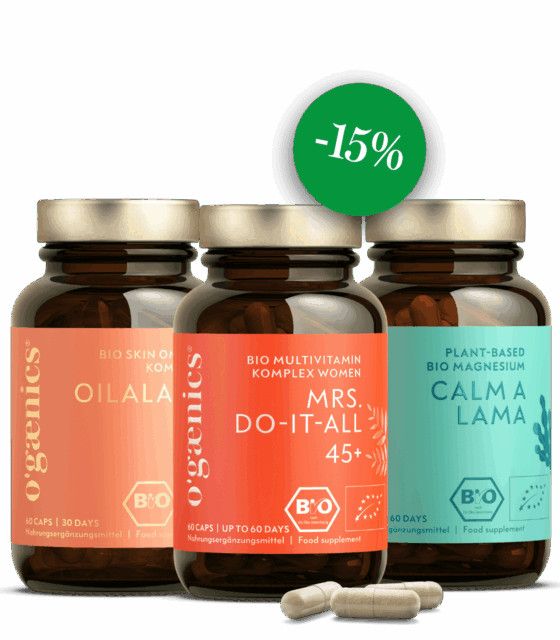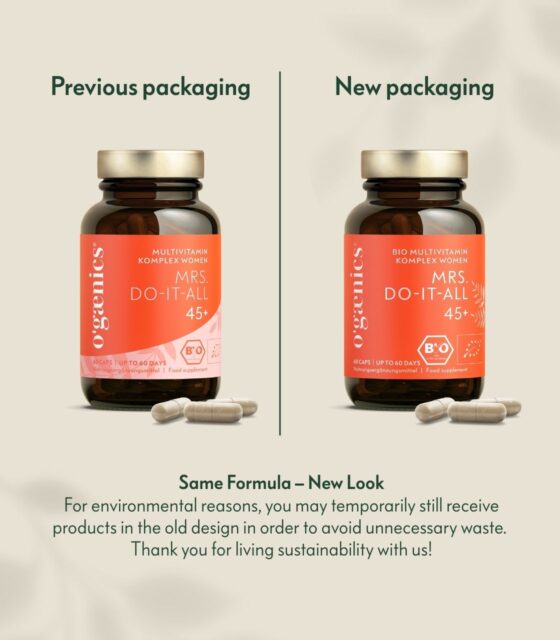IN THIS ARTICLE
01 The role of hormone replacement therapy (HRT) in the menopause
02 Why HET is not always necessary
03 Nutrition and lifestyle: natural allies
04 Nuts – protection against cardiovascular disease
05 The Mediterranean diet – anti-inflammatory and healthy for the heart
06 The DASH nutrition model – lowering blood pressure naturally
07 The importance of olive oil and antioxidants
08 Fruit and vegetables for mental health
09 Reduction of ultra-processed foods
10 Food supplements as support
11 Conclusion
These are the nutritional strategies that will help you stay healthy during the menopause.
Do you often wake up at night, feel exhausted in the morning, are easily irritated – and wonder whether this is “just part of it”?
You may have heard of hormone replacement therapy (HRT) – and found just as many reasons why it’s not for you.
Because you want to help your body, but in a natural way. Without risks. Without chemicals. Simply with what’s good for you.
The good news is that you have more influence on your well-being, your hormones and your health than you think.
And you don’t have to turn your whole life upside down – small, targeted changes to your diet, lifestyle and nutritional intake are enough.
For better sleep. More energy. And the feeling of coming back to yourself.
In this article, I will show you which natural strategies have proven their worth – scientifically sound and suitable for everyday use – and how you can manage your menopause in a self-determined and healthy way without hormone replacement therapy (HRT).
The role of hormone replacement therapy (HRT) in the menopause
Hormone replacement therapy is often recommended to relieve the symptoms of the menopause, such as hot flushes, mood swings, vaginal dryness and sleep disorders. It replaces the declining hormones in the body, particularly oestrogen and progesterone, which provides relief for many women.
However, not every woman wants to or is able to use HRT. Some have health concerns or find that the risks – such as an increased risk of breast cancer and blood clots – outweigh the benefits. For these women, the question is: How can I manage my menopause naturally and without hormone replacement therapy?
Why HET is not always necessary
Studies show that hormone replacement therapy is not the only way to stay healthy in the long term. In fact, there is a wealth of data showing that a healthy diet and active lifestyle can be just as effective in reducing the risk of chronic diseases such as high blood pressure, heart disease, osteoporosis, diabetes and dementia.
Herbal remedies such as ashwagandha can also help – the gentle adaptogen is particularly valued for its calming, sleep-promoting and hormone-regulating effects.
You can read more about its use and benefits in the article Ashwagandha benefits for women: Naturally effective
These findings are not only important for women who do not use hormone replacement therapy, but also for those who use HRT and decide to discontinue therapy in the future.
Diet and lifestyle: natural allies
A large number of scientific studies highlight the importance of diet and lifestyle for health during and after the menopause. Here are some of the key findings:
1. nuts – protection against cardiovascular diseases
A meta-analysis of 89 studies from 2022 found that daily consumption of 28 grams of nuts can reduce the risk of cardiovascular disease by 21% and all-cause mortality by 22%.
Nuts are rich in essential fatty acids and antioxidants, which are essential for cardiovascular health. Walnuts in particular contain flavonoids, which act as powerful antioxidants and protect the brain – a particularly important property during the menopause.
2. the Mediterranean diet – anti-inflammatory and healthy for the heart
A study from 2023 showed that a Mediterranean diet – rich in olive oil, fish, vegetables and wholegrain products – can significantly reduce inflammatory markers in the body after just six months.
As the menopause is considered an “inflammatory event” in the body, an anti-inflammatory diet is particularly beneficial.
The Mediterranean diet not only protects the cardiovascular system, but also improves brain health, which is particularly important for women who do not take hormone replacement therapy.
3. the DASH diet model – lowering blood pressure naturally
The DASH (Dietary Approaches to Stop Hypertension) dietary model is known for its ability to lower blood pressure. If you avoid hormone replacement therapy, your risk of high blood pressure is higher.
A plant-based diet with plenty of vegetables, fruit and little salt has been shown to reduce the risk of high blood pressure. Particularly during the menopause, certain vegetables such as broccoli and carrots can help to support oestrogen metabolism and regulate blood pressure.
4 The importance of olive oil and antioxidants
A long-term study published in the British Medical Journal in 2023 shows that a nutrient-rich diet is an important protective factor against Alzheimer’s disease. There is a particular focus on olive oil, which plays a central role in the Mediterranean diet.
Daily consumption of more than 7 grams of olive oil reduces the risk of dying from dementia-related causes by 28%. This underscores the importance of antioxidant foods such as olive oil in promoting cognitive health and preventing age-related diseases – a particularly important consideration for women on hormone replacement therapy.
5. fruit and vegetables for mental health
An increased intake of fruit and vegetables has been shown to be effective in improving the mental health of menopausal women. Fruit and vegetables are rich in fiber, which supports the growth of beneficial gut bacteria.
The gut is often referred to as our “second brain” as it produces 90% of the body’s serotonin, which is responsible for our wellbeing. A diet rich in fruit and vegetables can therefore help to alleviate mood swings and depressive symptoms during the menopause if hormone replacement therapy is not an option for you.
If you want to know how stress affects your gut and your mood during the menopause – and what you can do to rebalance this connection – read this article: 👉 What stress really does to your gut – and how to counteract it
You can read more about the menopause and gut health here.
6. reduction of ultra-processed foods
Studies show that a high consumption of ultra-processed foods is associated with an increased severity of menopausal symptoms. These foods often contain many additives that can promote inflammation in the body, which in turn exacerbates the symptoms of menopause.
Reducing these foods not only has short-term benefits, but also has a positive effect on long-term health.
If you want to reduce inflammatory processes in the body, it is also worth taking a look at your metabolism at cellular level.
👉 Here you can find out how to activate your cellular regeneration and fat utilization with the help of natural active ingredients – without any hormones:
How to stimulate your metabolism naturally
When nutrition alone is not enough: how supplements can really support you in everyday life
You may be familiar with this:
You try to eat healthily, exercise regularly, take care of yourself – and yet you often feel tired, unbalanced or simply not like yourself.
During the menopause in particular, so much changes in the body that sometimes it’s simply not enough to cover everything with your diet – and who has the time to eat perfectly every day or spend hours mixing smoothies?
This is where high-quality, natural food supplements can be just the missing piece of the puzzle – without synthetic additives, without unnecessary ballast. Simply give your body what it really needs right now: for your hormones, your energy, your inner balance.
Did you know that this is exactly where saffron comes in naturally and can support your mood and hormonal balance? 👉 You can read more about this here in our blog article about saffron and its effects during the menopause.
That’s why we’ve developed a set that is precisely tailored to these special needs – for women like you who consciously look after themselves but don’t want complicated routines or questionable solutions.
The menopause set – your daily support when everything is changing
The menopause is not a clearly defined period – it creeps up on you. Sometimes there is restless sleep, then these heat waves, days with a bad mood or the feeling of simply being “through” all the time.
You want to feel like yourself again – without artificial hormones, but also without endless to-do lists.
Our menopause set supports you specifically where you feel it in everyday life – with just a few high-quality capsules per day. For more balance, energy and the good feeling of giving your body what it needs right now.
🧡 Mrs. Do It All 45+
Your daily all-rounder for hormone balance, energy and mental strength.
- With 17 natural vitamins, minerals and antioxidants from organic plant extracts
- Supports your nervous system and helps with fatigue
- With organic cruciferous vegetable blend for hormonal metabolism
🌙 Calm A Lama – Plant-Based Magnesium
For your nerves, better sleep and relaxation when your mind won’t shut up. You can also find out about the longevity benefits of magnesium here
- Plant magnesium from algae
- For inner restlessness and irritability
- Also ideal for waking up at night
✨ Oilalala – Skin Omega Complex
Nourishes your skin from the inside, supports your cells and your hormone balance.
- Plant-based omega-3 fatty acids from organic sea buckthorn extract
- Against dry skin, dry mucous membranes
- Prevents inflammation
These food supplements offer a natural and effective way to support the body during the menopause – without the need for hormone replacement therapy.
In addition to the recommended dietary supplements, Cellular Life offers additional protection for your cells. The rich antioxidant complex helps to reduce oxidative damage and boost your cellular health – especially important at this stage of your life
Conclusion: choose the natural way
The decision to forego hormone replacement therapy does not mean that you are putting your long-term health at risk.
A nutritious diet, exercise and a healthy lifestyle can also be effective in preventing chronic diseases and alleviating the symptoms of the menopause.
In addition, high-quality dietary supplements such as our menopause set can provide useful support.
With the right knowledge and the right tools, you can view the menopause as a phase of strengthening and renewal. Dietary changes and natural supplements are the key to providing your body with optimal support – without the need for hormone replacement therapy.
- Clark, J.S.; Dyer, K.A.; Davis, C.R.; Shivappa, N.; Hébert, J.R.; Woodman, R.; Hodgson, J.M.; Murphy, K.J. Adherence to a Mediterranean Diet for 6 Months Improves the Dietary Inflammatory Index in a Western Population: Results from the MedLey Study. Nutrients 2023, 15, 366. https://doi.org/10.3390/nu15020366
- Cicero, Arrigo F G et al. “Dietary Intervention to Improve Blood Pressure Control: Beyond Salt Restriction.” High blood pressure & cardiovascular prevention : the official journal of the Italian Society of Hypertension vol. 28,6 (2021): 547-553. doi:10.1007/s40292-021-00474-6
- Jayusman, Putri Ayu et al. “Overview on postmenopausal osteoporosis and periodontitis: The therapeutic potential of phytoestrogens against alveolar bone loss.” Frontiers in pharmacology vol. 14 1120457. 23 Feb. 2023, doi:10.3389/fphar.2023.1120457
- Jia J, Zhao T, Liu Z, Liang Y, Li F, Li Y et al. Association between healthy lifestyle and memory decline in older adults: 10 year, population based, prospective cohort study BMJ 2023; 380 :e072691 doi:10.1136/bmj-2022-072691
- Tessier A, Cortese M, Yuan C, et al. Consumption of Olive Oil and Diet Quality and Risk of Dementia-Related Death. JAMA Netw Open. 2024;7(5):e2410021. doi:10.1001/jamanetworkopen.2024.10021
- Dominika Guzek, Dominika Gła¸bska, Barbara Groele, Krystyna Gutkowska, Fruit and Vegetable Dietary Patterns and Mental Health in Women: A Systematic Review, Nutrition Reviews, Volume 80, Issue 6, June 2022, Pages 1357-1370, https://doi.org/10.1093/nutrit/nuab007
- Noll PRES, Noll M, Zangirolami-Raimundo J, Baracat EC, Louzada MLDC, Soares Júnior JM, Sorpreso ICE. Life habits of postmenopausal women: Association of menopause symptom intensity and food consumption by degree of food processing. Maturitas. 2022 Feb;156:1-11. doi: 10.1016/j.maturitas.2021.10.015. Epub 2021 Oct 29. PMID: 35033227.










 No products in the cart.
No products in the cart.